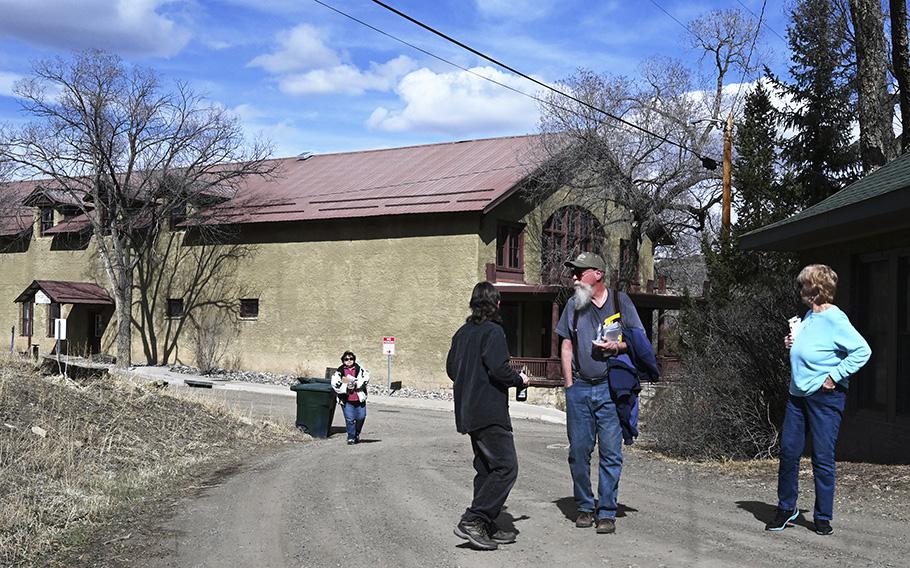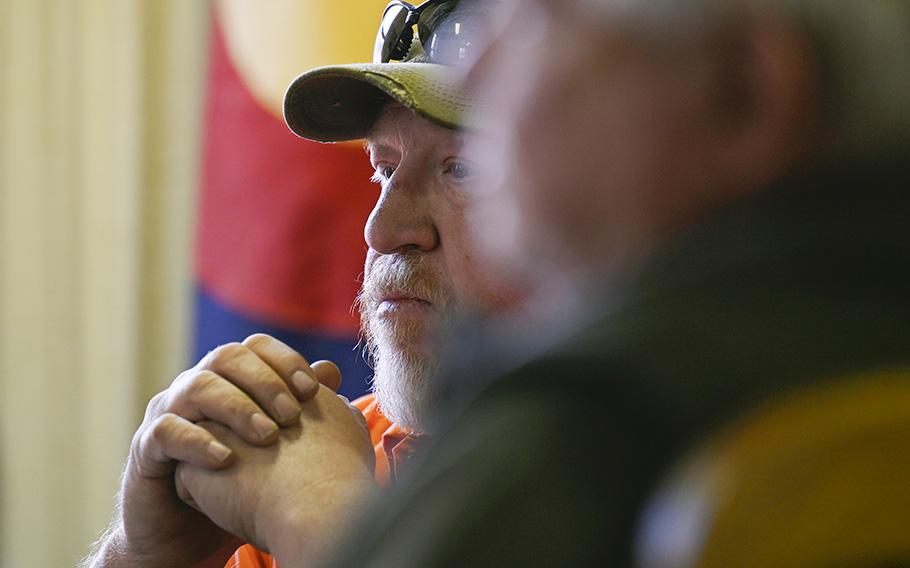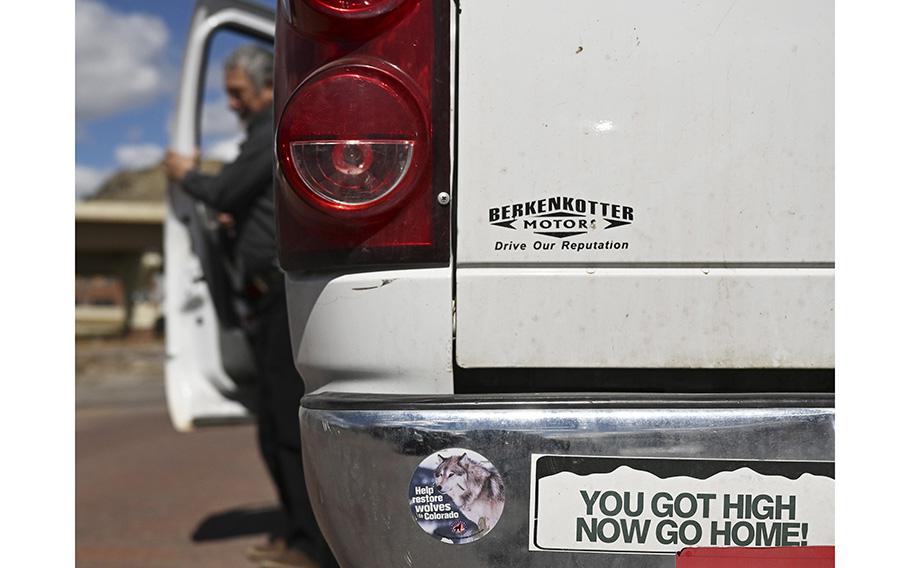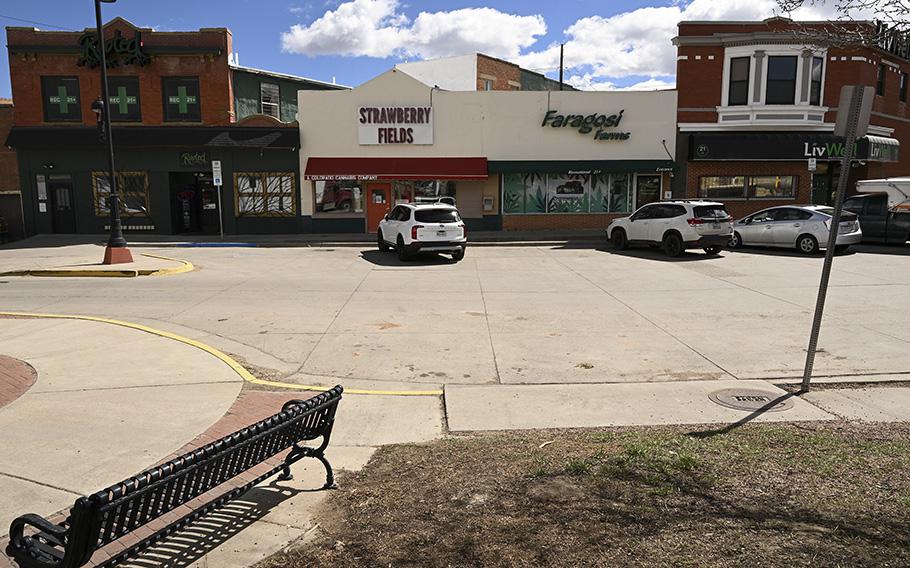
Dorthy Vigil, left, hustles to catch up with her neighbors after they attended a town hall meeting on March 20, 2023, in Cokedale, Colorado. Vigil has lived in Cokedale for 52 years. (RJ Sangosti/The Denver Post/TNS)
COKEDALE, Colo. (Tribune News Service) — Jack Van Heesch experimented hard with all sorts of psychedelics back in the day.
"It was a party," said the full-bearded, 66-year-old resident of this former Colorado mining town perched in the shadows of the Spanish Peaks in Las Animas County.
Van Heesch was one of nearly 1.3 million Coloradans last November to vote for Proposition 122, which decriminalized the growing, use and sharing of psilocybin and psilocin — key compounds found in "magic mushrooms" — along with ibogaine, mescaline and dimethyltryptamine, or DMT.
But his was a rare yes vote in Cokedale, a tiny hamlet of 150 hardscrabble residents seven miles west of Trinidad. The town, with its 350 defunct coke ovens signifying its legacy as a one-time coal mining hub, isn't jazzed about psilocybin healing centers coming in.
Residents cite concerns about crime, transients, exposure of psychedelics to children and any funding that might be needed to regulate the industry.
"It's a quality of life thing here," Cokedale Mayor Jason Swetky said.

Cokedale Mayor Jason Swetky listens to a town hall meeting on March 20, 2023, in Cokedale, Colorado. A group of residents from Cokedale talked about the implementation bill for Prop 122, which legalized psilocybin mushroom use in Colorado. The residents that attended want to make sure local control is part of the bill. (RJ Sangosti/The Denver Post/TNS)
Van Heesch agrees, saying the final word on psychedelics should rest with the residents of Cokedale.
"Does the town have the right to say 'no' to it? Yeah," he said to murmurs of approval from a dozen or so fellow residents recently gathered inside the town's century-old mercantile building, which houses the post office, town hall and a mining museum.
Despite the nod to local control here, city and county governments in Colorado are, in fact, not allowed to banish the psychedelics industry from inside their borders.
"Proposition 122 specifically prohibits local bans," said state Sen. Steve Fenberg, a Boulder Democrat and the Senate president. "So a municipality can't ban — but it can regulate time, place and manner."
The state legislature is expected to start crafting an implementation bill for Prop 122 in the coming weeks, Fenberg said. Psilocybin remains an illegal Schedule I drug under the federal Controlled Substances Act. Colorado's measure only permits use of psychedelics by those 21 and older.
Despite the ballot measure's explicit prohibition on local opt-outs on psilocybin healing centers, municipal and county leaders from the Kansas line to the Utah line are intent on inserting as much local control as they can into whatever psychedelics-related legislation emerges at the state House this spring.
The refrain at the Colorado Municipal League's annual legislative workshop in Denver in February was clear: regulate mushrooms like marijuana.
"Colorado has established a precedent with marijuana that allows Colorado communities to choose whether, and to what degree, they want to allow controlled substances in their communities," league executive director Kevin Bommer said. "That precedent has been working well for state and local governments, but Prop 122 deviates from this model."
Cities and towns, Bommer said, should be able to "choose whether the presence of natural medicine and healing centers makes sense for their communities," given that Prop 122 won with less than 54% of the vote and "plenty of communities across Colorado have made it clear they do not support the allowances in Prop 122."
More than half of the state's counties — 36 of 64 — voted down the mushroom measure in November, noted Eric Bergman, policy director for Colorado Counties Inc.
"We are not looking to take away personal possession, use and home grows," he said. "We just want to be able to decide locally if we will have commercial psilocybin businesses in our communities."
The jostling over the introduction of magic mushrooms is just the latest clash in a long-running dispute over what power and authority belongs to Colorado's cities and counties versus the state. In recent weeks, municipal leaders have vociferously attacked Gov. Jared Polis' sweeping land-use reform bill as a massive overreach by the state. And four years ago, a new state law gave local governments significantly more control over oil and gas operations — powers that were once the sole province of the state.
Greenwood Village Mayor George Lantz invokes the "home rule" powers that many Colorado municipalities possess to assert that his city, which voted against Prop 122, should be able to curtail the psilocybin sector the way it did cannabis.
"We are concerned, as are most municipalities, over the availability and adverse effects of all mind-altering drugs on our citizens and especially our children," Lantz said. "We are facing a drug crisis where the availability of mind-altering drugs of all types is creating a drug culture with increasing homelessness, crime (and) dangerous conditions on our roads…"
Defense of local control is shared by communities that both embrace and reject retail pot and cannabis cultivation. In the state's southwest corner, Cortez has a thriving marijuana scene, with several dispensaries and a grow facility. But it's that way, said City Manager Drew Sanders, because residents willed it so.
"It's not fair we have something imposed on us without any say," he said. "Oftentimes, we feel our voice is not heard on the Front Range."
More than 400 miles to the east, Lochbuie said 'no thank you' to recreational or medical pot sales. The rapidly growing Weld County town of 8,500 wants the same discretion on psychedelics.
"So little is known about these products that it makes sense that local elected officials get to make the decision on it," Town Administrator Brian McBroom said.
‘Changed my life’
Allison Wilson, founder of The Hope Project, said much is in fact known about psychedelics and their healing properties. Her Parker-based organization helps female veterans, military spouses and gold star wives with counseling and support via "psychedelic healing journeys."
Wilson said she was introduced to hallucinogens when her Navy Seal husband tried ibogaine, an extract from an African shrub, six years ago. Wilson, who had been taking anti-depressants for 16 years, decided to go on a journey of her own. She used MDMA, or ecstasy, along with psilocybin in a controlled setting and under guidance.
She has since been on two more journeys, and she microdoses with mushrooms too.
"It really changed my life," Wilson said. "Psychedelics are able to break down that armor and get to the problem."
She hasn't had to use prescription painkillers since her first psychedelic experience.
"I was able to get to exactly where my trauma was," Wilson said.

Nick Lamuhlnicek of Raton, New Mexico, gets out of his truck before heading to lunch in Trinidad on March 20, 2023. He was in town for a doctor’s appointment. The retired electrician and former Green Beret supports Colorado having healing centers for those that need to use mushrooms. “When I was serving I went to the first Iraq war. Kids who serve today might be in 11 different wars before they are done,” he said. (RJ Sangosti/The Denver Post/TNS)
Prop 122 proponents asserted during last fall's campaign that psilocybin has shown promising results in treating depression, post-traumatic stress disorder and nicotine and alcohol addiction. Even though the substance remains illegal under federal law, the Federal Drug Administration designated it a "breakthrough therapy" for depression in 2018.
Denver decriminalized magic mushrooms nearly four years ago, becoming the first city in the nation to do so.
Because of psychedelics' therapeutic potential, Wilson said it isn't right to deny people medicine as close to where they live as possible.
"If we do have a county opt out, what happens to the people there who need that support?" she said.
And comparing the mechanics of the cannabis industry to the psychedelics industry is a faulty contrast, Wilson said. Prop 122 doesn't call for magic mushroom retail shops.
"It's so different from medical cannabis — we're not selling psilocybin in a store, we're providing support before, during and after (its use)," she said. "This isn't us trying to get mushrooms on the streets — this is us trying to give help that we know works."
Kevin Matthews, a Prop 122 proponent with the Natural Medicine Health Act, said "limiting access to therapeutic services will increase already existing mental health disparities, especially in rural communities where some people cannot afford the additional expense of traveling to other cities or counties where healing centers are allowed."
Something as vital as healthcare, he said, shouldn't be balkanized across counties and cities.
"Because access to natural medicines is a matter of statewide concern, making it more difficult for people to access these medicines across the state creates additional and unnecessary burdens for those who can likely benefit the most," Matthews said.
Oregon, the only other state to have decriminalized psilocybin, took the opposite tack when its voters passed Ballot Measure 109 in 2020. The state included a local opt-out, and so far nearly 150 cities, towns and counties have banned or limited psilocybin cultivation and "service centers."
According to a map compiled by Psychedelic Alpha, an advocacy group that tracks progress on psilocybin bills in state legislatures, almost the entire eastern half of Oregon decided against playing host to the industry. The two counties that encompass the southeast corner of the state — Harney and Malheur — are together larger than Maryland and eight other U.S. states.
The nearly 40,000 rural residents that live there will have no easy access to service centers.
‘We can’t handle that’
Cokedale Trustee Bob Holman said there are many specialty healthcare services that are simply not available to residents in rural areas of the state and psychedelics shouldn't get special status.

Several marijuana shops are grouped together on March 20, 2023, in Trinidad, Colorado. Trinidad near the Colorado and New Mexico state line has around 20 marijuana dispensaries. (RJ Sangosti/The Denver Post/TNS)
"I know someone who had to drive (92 miles) to Pueblo every day for four weeks for radiation treatment," he said of a neighbor. "We should have some freedom to say we don't want it here."
Residents worry about replicating some of the problems in Cokedale that they see down the road in Trinidad, where they say 20 or so pot shops amongst a population of fewer than 9,000 have led to a noticeable transient and homeless population.
"I don't want to wake up in the middle of the night with someone on my lawn tripping on mushrooms," said Laurie Johnson, a three-year Cokedale resident.
In rural Baca County, which borders Kansas, Oklahoma and New Mexico, Commissioner Rick Butler worries about traffickers moving mushrooms and other psychedelics out of Colorado along U.S. 287/385.
"That's a major thoroughfare between Dallas and Denver," he said. "You're talking about a county with four or five deputies. We can't handle that."
Baca County, with a population of just 3,500, voted down Prop 122 and allows no marijuana grows or retail stores. On the other side of the state, Montrose County Commissioner Sue Hansen said no one knows the "long-term effects of allowing this in the county."
That's why the decision about its spread should remain local, she said.
"The diversity between counties is evident and what works in the metro corridor doesn't always work well in the rural and smaller counties," Hansen said.
But backers of Prop 122 are adamant that their measure not get watered down. In February, proponents of psychedelic medicine faced off with state lawmakers in a legislative town hall in Boulder to demand that the General Assembly not gut the spirit of what voters passed.
Wilson, with The Hope Project, said the voters have spoken and local opt-outs were not part of the ballot measure.
"You vote to see who has the higher number of yes votes — and we won," she said.
©2023 MediaNews Group, Inc.
Visit at denverpost.com.
Distributed by Tribune Content Agency, LLC.